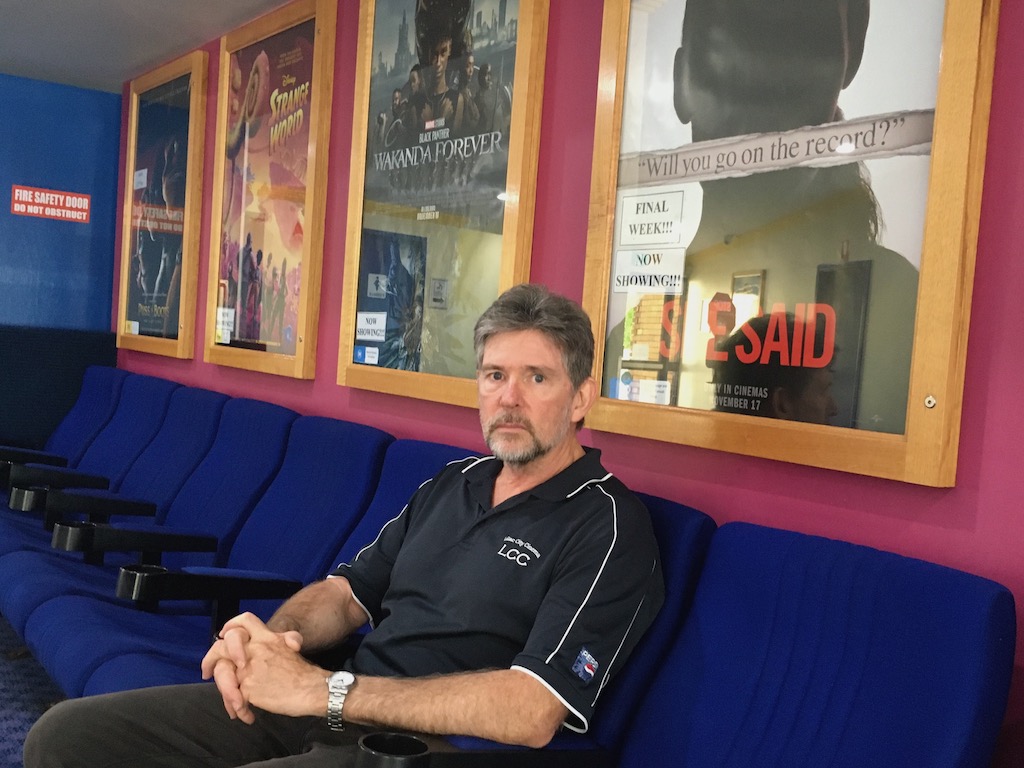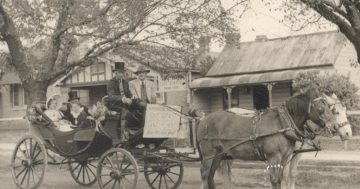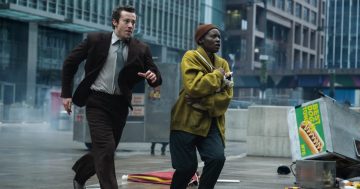
Owner Andrew Moore is hoping Avatar: The Way of Water helps stave off imminent closure of Lilac City Cinema in Goulburn. Photo: John Thistleton.
Lilac City Cinema in Goulburn is on the brink of closing. Andrew Moore, who owns the cinema with his brothers Greg and Adam, said takings were down 70 per cent compared with pre-COVID-19 patronage.
“We have arrived at the point of saying ‘Goulburn, use it or lose it’,” Mr Moore said. “To remain viable, we need 150 to 200 patrons a day. We are lucky to see 30 or 40 people. We have been surviving on our savings – money set aside prior to COVID. In my opinion, COVID has ruined the world.”
The dramatic slump is being felt by cinemas across Australia. Mr Moore appealed to Goulburn people to come either weekly or monthly to help keep the doors open at the four-theatre cinema, which he and his wife, Mandy, have been running since 2006.
The cinema once attracted 500 movie-goers a day, and up to 900 on Saturdays. Occasionally, 1300 people came to watch a blockbuster movie. Now the cinema gets 30 to 70 people a day.
The 2019-20 financial year was one of Lilac City Cinema’s best years until February 2020. Then COVID-19 struck.
“As soon as we shut the doors on 23 March, 2020, it [the business] switched off for three to four months. Then we reopened with the Russell Crowe film Unhinged,” Mr Moore said.
“It wasn’t setting the world on fire, but at least we had something to put on the screen and there were a few films that filtered through. I think people have become accustomed to sitting at home.”
Running costs at the cinema, which employs 22 part-time staff, have risen sharply. Power costs $6000 to $10,000 a month.
The film companies expect between 50 and 55 per cent of every dollar the Moores take in ticket sales.
“For every dollar we take, they get 55 cents, we get the remaining 45 less GST,” he said. “We are expected to survive on 40 cents in the dollar.” They rely on candy bar sales to make a profit.
Mr Moore said people spent extra money from the JobKeeper allowance on home entertainment, boosting the streaming services industry.
“The cinema industry is capitalising on streaming and that’s where we are just losing it,” he said. “I think people are out of the habit of going out.”
Movie producers wanting a return on their investment were making new releases available almost immediately on streaming services. Previously, cinemas had the releases exclusively for 60 to 90 days. Now it’s several days at best.
“Some of the recent movies have streamed the day after we have premiered here,” Mr Moore said.
“Years ago they said videos would see the demise of cinemas. We bounced back. The same with DVDs, we bounced back. But this time, I don’t know whether we can bounce back.”
The cinema relies on school holidays to make a profit.
“Six weeks over summer, two weeks over Easter, two weeks in winter and two in spring, we bank our money, which helps us survive the lean times in between,” Mr Moore said.
Good films such as Happy Feet, the Pirates of the Caribbean series, Star Trek, Fast and Furious and The Twilight Saga vampire series have helped turnover previously.
Downton Abbey and similar types of movies brought retirees to the 10:30 am sessions during the week. This age group has also dwindled. Mr Moore said many of the core audience among older patrons had died since COVID-19.
Mrs Moore said the Federal Government had helped cinemas during the pandemic with Screen Australia grants. Lilac City Cinema spent its grants employing staff and on upgrades to theatres. Additionally, NSW Government vouchers “kept us alive”, she said.
Andrew’s father, Ron, bought the Lilac City Cinema for about $4.5 million from previous owner Bill Fawkes in 2000. Mr Fawkes had established the cinema, initially leasing the Lilac Time Hall from the council. Part of the deal required the Moores to complete redeveloping the theatre into four separate cinemas.
The Moores also own and operate a three-screen cinema at Campbelltown, which is having a similar struggle to survive.









